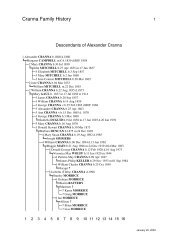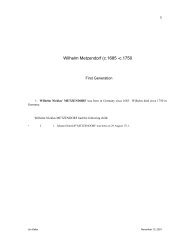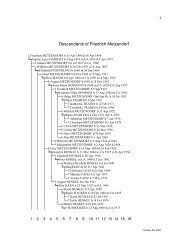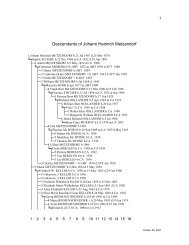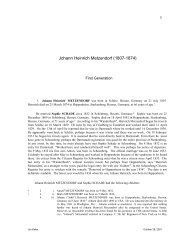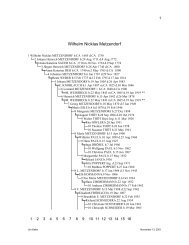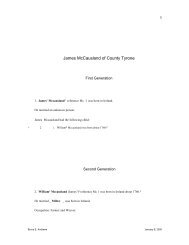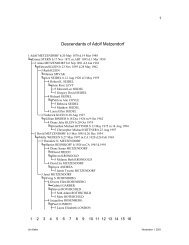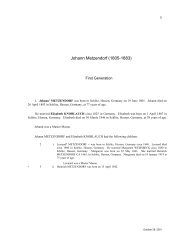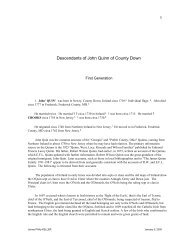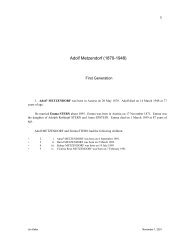A short Account of the <strong>Quinn</strong>, West, Lacy, Pottenger, Kincade <strong>and</strong> Wilson FamiliesE.F.L. <strong>Quinn</strong>Robert <strong>Quinn</strong> my gr<strong>and</strong>father, was born in New Jersey on the 24th day of February, 1761. He served in the army ashort time during the Revolutionary war, having come of age shortly before its close. In 1787 he eloped with <strong>and</strong>married Elizabeth Lacey, a sister of Gen. John Lacey of the Revolution, having met her at a ball in Georgetown,where the Lacey’s were then living. In 1789 he removed to Georgia <strong>and</strong> purchased a farm near Wrightsborough,Columbia county, Georgia. My gr<strong>and</strong>father lived in Georgia for about sixteen years <strong>and</strong> there all of his childrenexcept one were born, <strong>and</strong> there likewise one Lacey died <strong>and</strong> was buried. My gr<strong>and</strong>mother’s father also died thereabout the year 1794. My father who is now nearly eighty-three years of age, says he can just recollect him.About the year 1804 my gr<strong>and</strong>father sold his farm in Georgia <strong>and</strong> made preparations for coming north again. Hehowever rented for about a year <strong>and</strong> spent the time in prospecting for a new home. He looked through Tennessee,but did not like it sufficiently well to move there.At length hearing a great deal about Ohio <strong>and</strong> some of his neighbors who were Quakers being about to move thereon account of slavery not being permitted in that state, he, without seeing the country, concluded partly for the samereason, to go with them. Accordingly on March 1st, 1805, they ( * ) started in wagons on their long journey of fivehundred miles, a great portion of the way through an almost unbroken wilderness, crossing mountains <strong>and</strong> rivers intheir route. One of their neighbors who had started for the same destination a week or two in advance of them had asick daughter. She was anxious to come to Ohio, perhaps thinking {page 13} she would regain her health, but on theroad she became worse <strong>and</strong> died <strong>and</strong> I have heard my father say that as they came along over the same route theysaw her grave by the road side in a lonely spot amidst the Cumberl<strong>and</strong> mountains.Our folks made the trip safely <strong>and</strong> after about seven weeks of travel (coming by way of Cumberl<strong>and</strong> Gap) arrived inOhio. <strong>The</strong>y crossed the Ohio river at Cincinnati <strong>and</strong> came up to the neighborhood of Germantown, Montgomerycounty, <strong>and</strong> there rented a farm for a year. At the end of that time my gr<strong>and</strong>father moved to what is now Laniertownship in Preble county, <strong>and</strong> rented the farm now owned by Geo. T. Potterf <strong>and</strong> situated at the point whereBanta’s Fork crosses the Winchester <strong>and</strong> West Alex<strong>and</strong>ria turnpike. While living there he entered the farm nowowned by my father in Twin township, three miles east of Eaton on the Dayton pike, being the southeast quarter ofsection 31 in that township, <strong>and</strong> the next year, 1807, moved on it <strong>and</strong> there lived until he died in April, 1844, aperiod of about thirty-seven years. He had brought with him from Georgia six hundred dollars in gold <strong>and</strong> silver.<strong>The</strong> family moved on the new farm in February, 1807 <strong>and</strong> while living in a temporary house or camp, there camewhat is known among the early settlers of Ohio, as “Cold Friday,” said to have been the coldest day everexperienced in the Miami Valley. Birds were frozen to death <strong>and</strong> were picked up in numbers as soon as the weathermoderated sufficiently to permit people to venture out of doors.In the year of 1811 the central part of the main house, now st<strong>and</strong>ing on the farm, was erected, it is two story <strong>and</strong>twenty-eight feet by eighteen. One night while the house was being erected, happened the earthquake on theMississippi, the shock of which was distinctly felt by my gr<strong>and</strong>father <strong>and</strong> gr<strong>and</strong>mother. I have heard my father saythat on the next morning while some of them were st<strong>and</strong>ing in the yard talking about it a second shock was felt thatrattled the skids which had been used in rolling up the timbers on the previous day <strong>and</strong> which were still st<strong>and</strong>ingleaning against the house. Prior to the building of this house there had been two other houses erected for dwellings,one of which stood on the spot where it was originally erected until about twenty years ago (1853.) <strong>The</strong> other househad disappeared long before I can remember.<strong>The</strong> old apple orchard on the farm was set out in the year 1812.My gr<strong>and</strong>father also entered the northeast quarter of section 18 in the same township but sold it a year or two {page14} afterward to an old friend of his who had followed him from Georgia—William York.When the war of 1812 broke out Preble county contained a little over three thous<strong>and</strong> inhabitants <strong>and</strong> was really onthe border although some settlements had been made about Greenville <strong>and</strong> perhaps in other portions of Darkecounty. At one time a party of Indians came to our house <strong>and</strong> dem<strong>and</strong>ed food, on receiving which they departed.In the spring of 1813 my uncle, James <strong>Quinn</strong>, was drafted in Lt. James Black’s company of Ohio militia. <strong>The</strong> draftwas for six months. He went out <strong>and</strong> served about thirty days when he was detailed to come home with a sick comrade,Milner, who died shortly after he reached his home. Instead of returning my uncle had my father go out in hisplace <strong>and</strong> remained about four weeks longer at home. He then returned to his post <strong>and</strong> remained a month or so longer,when he again came home on a furlough <strong>and</strong> sent his younger brother, Robert, who served out the remainingportion of the time, hacking a few days, when James, who had in the mean time served in Capt. Joseph C. Hawkins’company, returned to Black’s company <strong>and</strong> was discharged with it. He then went back to Hawkins’ company <strong>and</strong>served out the rest of the time there. <strong>The</strong>y seemed to have made very little account of trained soldiers <strong>and</strong> to havehad a way of substituting in the war of 1812, entirely novel to us who have seen service in the great rebellion.* Robert, John <strong>and</strong> James <strong>Quinn</strong> <strong>and</strong> their sister, Elizabeth Bennett, with their families.6
A short Account of the <strong>Quinn</strong>, West, Lacy, Pottenger, Kincade <strong>and</strong> Wilson FamiliesE.F.L. <strong>Quinn</strong>My father was drafted in Hawkins’ company, which draft took place about the 28th of September, 1813, <strong>and</strong> servedthe entire six months, returning in the spring of 1814. After that none of them were in the army, <strong>and</strong> peace wasmade the following winter. None of them ever saw a hostile enemy while out, I believe, but in other ways theyexperienced considerable hardships. <strong>The</strong> Indians never penetrated as far as where our folks hived, although therewere several white persons killed between there <strong>and</strong> Greenville in Darke county, a distance of twenty-five miles.Jane, the eldest child of Robert <strong>Quinn</strong> <strong>and</strong> Elizabeth Lacey <strong>Quinn</strong>, born in Virginia in 1788, married Finley Hartabout the holidays of 1811. By him she had eight children who lived to be grown, all of whom married with but oneexception. Isaac, the oldest, now lives in Kansas. He has four or five children, mostly grown <strong>and</strong> some married.Robert, the second son, died in Illinois some years ago, leaving a considerable family. One daughter married Dr.Younkers <strong>and</strong> now lives in Leavenworth, Kan. She is the only one of Robert’s children that I have seen since theywere small. Part of them live in Illinois <strong>and</strong> part in Kansas. John, the third son {page 15} of Jane <strong>and</strong> Finney Hart,married <strong>and</strong> died in Preble county about the year 1846 or 1847, without children. Samuel, the youngest son, nevermarried. Of the daughters Elizabeth the oldest, moved to Illinois with the family in 1849 <strong>and</strong> there married a mannamed Ross. Mary Ann, the second one, married William Wyatt shortly before the family moved west. He died ina year or two, leaving her a widow with one child, a son. After her husb<strong>and</strong>’s death she followed her family <strong>and</strong>now lives near Abingdon, Knox county, Illinois. Her son has lately married. Esther, the third daughter, married aman named Stephen Prats a year or two after they moved west <strong>and</strong> now lives in Peoria county, Illinois. She has alarge family of children. Matilda Caroline, the youngest, also married in Illinois. Her husb<strong>and</strong>’s name is JosephHarris. <strong>The</strong>y live adjoining Abingdon, Illinois. Aunt Jane died near a little town named Rochester, (Elmore postoffice) Peoria county, Illinois, about the year 1863, but I do not now remember the exact date. She was in theneighborhood of seventy-five years of age. Her husb<strong>and</strong> had died several years younger.My father was the second child of Robert <strong>and</strong> Elizabeth Lacy <strong>Quinn</strong>.Next younger than my father was James. About the year 1817 he married Sarah Glines <strong>and</strong> by her had sevenchildren who lived to be grown, all of whom except one are still alive. John Lacey, the oldest, is now in the grain<strong>and</strong> tobacco business in Eaton, Ohio. He married Louisa Hewitt June 25, 1840, <strong>and</strong> has one son, Nelson J., who isin partnership with him. John Lacey <strong>Quinn</strong> was born on the 29th day of February, 1820. His son is about thirty-oneyears of age, is married <strong>and</strong> has a large family. Robert Marion <strong>Quinn</strong>, the second son <strong>and</strong> third child of James<strong>Quinn</strong>, also lives in Eaton. He has a large family, <strong>and</strong> is about forty-nine years of age at this time (1873). JamesHarvey <strong>Quinn</strong>, the third son, lives at Abingdon, Illinois <strong>and</strong> is engaged in the stove <strong>and</strong> hardware business. He ismarried <strong>and</strong> has a large family. His age is about forty-six or seven years.William D. <strong>Quinn</strong>, the fourth son, lives in Eaton with his brother John Lacey. He was postmaster at Eaton during allof Lincoln’s <strong>and</strong> part of Johnson’s administration. He has always been very popular <strong>and</strong> was this fall elected countyclerk of the court by 242 majority over the regular Republican nominee, while at the same time the county gave theRepublican state officers 426 majority over their Democratic opponents. He is however <strong>and</strong> has always been aRepublican <strong>and</strong> the contest for clerk turned on local matters. My own opinion was <strong>and</strong> is that his running was amistake, {page 16} for while he has himself secured an office which may or may not prove profitable to him, he has tosome extent compromised his entire family connection with a party with which it has always acted <strong>and</strong> out of whichnone of them can feel at home.Joseph H. <strong>Quinn</strong>, the youngest son, died of consumption the year of 1851, at the age of about twenty-two years, <strong>and</strong>is buried in the Eaton cemetery. He is the only one of the family to die of that disease. Of the daughters, Eliza Annwas born, I think, in 1822, <strong>and</strong> was married to George Irvin, I believe, in 1842. She has one son <strong>and</strong> two daughters,all grown <strong>and</strong> the daughters married. <strong>The</strong> oldest married a man by the name of Cramer. Eliza Ann <strong>and</strong> George Irvinlive in Winchester, R<strong>and</strong>olph county, Indiana.Sarah Jane, the youngest daughter <strong>and</strong> child of James <strong>Quinn</strong>, was born, I think, in the year 1837. About the year1853 or 1854 she married Sylvester Irvin, a brother of her sister’s husb<strong>and</strong>. <strong>The</strong>y also live in Winchester, Indiana,<strong>and</strong> have a large family.My uncle after his marriage, first settled on Banta’s Fork on what is known as the “forty foot pitch,” where his eldestchildren were born. I have heard my cousin, John Lacey <strong>Quinn</strong>, say that when a boy he had picked up a great manyrelics of Wayne’s army, as that was one of its camping grounds. He afterwards moved down on my gr<strong>and</strong>father’sfarm where he built a house on the hill across the second branch from the home dwelling about seventy-five yardswest of the “<strong>Quinn</strong> free turnpike.” <strong>The</strong> house was gone before my recollection. While living there my uncle <strong>and</strong> myfather went into the distilling business <strong>and</strong> built a still house across the branch from my father’s dwelling at theplace where the hill north of that branch runs down to a point. <strong>The</strong> house was built at the south side of this point <strong>and</strong>abutting against the hill. <strong>The</strong>y brought their water in wooden pipes from the spring now used by the family. <strong>The</strong>rewas an excellent peach as well as apple orchard on the farm <strong>and</strong> they made both peach <strong>and</strong> apple br<strong>and</strong>y as well aswhiskey. <strong>The</strong>y ab<strong>and</strong>oned the business long before I was born <strong>and</strong> I can just recollect the old house as it originallystood <strong>and</strong> the sale of the old copper still to James Kilkenny, a tinner in Eaton. When they quit the distilling businessmy uncle bought a farm of about sixty acres adjoining my gr<strong>and</strong>father’s on the east, moved on it <strong>and</strong> lived there theremainder of his life. His uncle, Joseph C. <strong>Quinn</strong>, lived with him most of the time after his return from Missouri <strong>and</strong>7
- Page 1 and 2: A Short Account of theQuinn, West,
- Page 3 and 4: A short Account of the Quinn, West,
- Page 5: A short Account of the Quinn, West,
- Page 9 and 10: A short Account of the Quinn, West,
- Page 11 and 12: A short Account of the Quinn, West,
- Page 13 and 14: A short Account of the Quinn, West,
- Page 15: A short Account of the Quinn, West,



